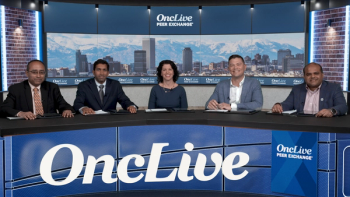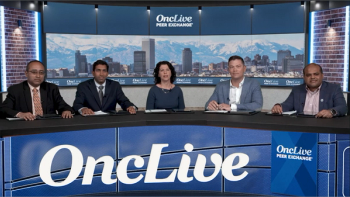
Myeloproliferative Neoplasms
Latest News

Latest Videos

CME Content
More News

Luspatercept has been recommended for approval by the EMA for patients with transfusion-dependent anemia and lower-risk myelodysplastic syndromes.

David A. Sallman, MD, discusses the potential use of fedratinib to manage symptomatic myelodysplastic syndrome/myeloproliferative neoplasms.

Experts discuss how treatments, either monotherapy or combination, may impact the treatment landscape for MF and how they might choose among the new agents.

Investigation of RVT-2001 will be discontinued following an insufficient display of benefit in patients with myelodysplastic syndrome.

Mikkael A. Sekeres, MD, MS, discusses the influence of therapeutic developments and conflicting classification systems on the management of MDS.

Panel experts comment on the role of combination therapies in MF and debate if these therapies will be the new standard of care.

Faculty offer insights into the future of PV management as well as unmet needs.

Talha Badar, MBBS, MD, discusses key efficacy data with imetelstat from the phase 2/3 IMerge trial of patients with lower-risk myelodysplastic syndrome.

Akriti Jain, MD, discusses the outcomes of the phase 3 COMMANDS trial in transfusion-dependent lower-risk myelodysplastic syndromes.

Health Canada will review the new drug submission seeking the approval of momelotinib in patients with myelofibrosis.

Faculty discuss the best strategies to monitor patients who are receiving treatment of MF as well as commenting on when it might be appropriate to switch therapies.

Expert oncologists provide insights into how they might manage patients who present with anemia and myelofibrosis in their practice.

Billy Truong discusses the rationale for investigating the functions of ERK2 substrate binding modalities in patients with myeloproliferative neoplasms.

Gabriela Hobbs, MD, discusses the significance of key research across myeloproliferative neoplasms from the 2023 ASH Annual Meeting.

Talha Badar, MBBS, MD, discusses the FDA approval of ivosidenib for patients with myelodysplastic syndrome and the future management of this disease.

Momelotinib gets market authorization from the European Commission for patients with MPNs and disease-related splenomegaly or moderate to severe anemia.

Overview of the current FDA approved treatment options for the management of myelofibrosis as well as reviewing recent updates from ASH 2023 on the SIMPLIFY and PERSIST trials.

Panel experts comment on the role of transplant in patients with myelofibrosis.

Talha Badar, MBBS, MD, discusses myelodysplastic syndrome risk stratification and the FDA approval of luspatercept for patients with this disease.

Guillermo Garcia-Manero, MD, spotlights the evolution of oral azacitidine- and decitabine-based regimens for MDS.

Nicole D. Vincelette, PhD, discusses the role of MYC expression in a subgroup of triple-negative myeloproliferative neoplasms.

Experts discuss the clinical implications of the MAJIC-PV trial.

Panel experts talk about when to use cytoreductive therapy and which factors influence their treatment selection as well as reviewing how patients with PV are monitored.

Tamibarotene plus venetoclax/azacitidine elicited higher responses rates vs venetoclax/azacitidine in RARA-overexpressed acute myeloid leukemia.

GB2064 displayed efficacy with a generally acceptable tolerability profile in the treatment of patients with myelofibrosis.











































